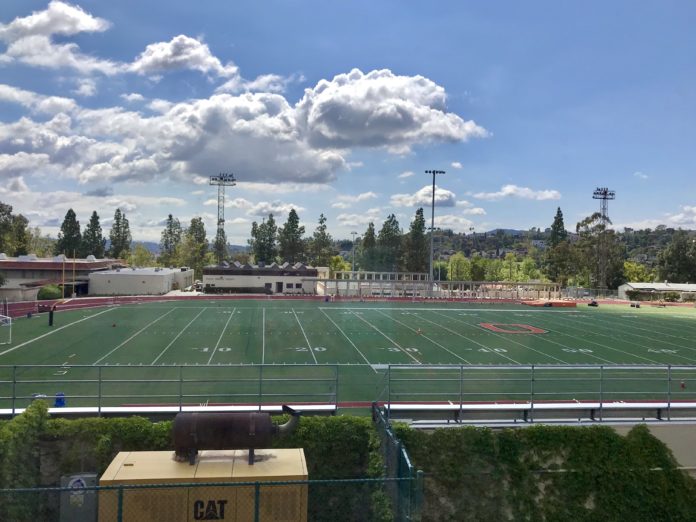To combat a low rate of reporting mental health issues among student athletes, Emmons Wellness Center is providing free and confidential counseling for Occidental varsity student-athletes called “Between The Lines”, every Friday, from noon–2 p.m. According to Joe Gonzalez, Occidental’s head athletic trainer, “Between the Lines” aims to provide a comfortable and easily accessible space for varsity student athletes to consult with a licensed therapist.
Gonzalez said the Occidental athletics department is hoping student athletes will see that taking care of their mental health is just as important as taking care of their physical health.
With roughly 25 percent of students at Occidental participating in varsity sports, Emmons and the Occidental athletic department saw a need to support student athletes, according to Richard Estrada, a licensed therapist at Emmons. Estrada said that since seeking out help can be difficult, especially through counseling, “Between The Lines” sessions are intended to lessen stigmas, fears or challenges students might have when addressing their mental health.
“As a former student athlete both in high school and college I understand the demand and rigor that varsity student athletes go through both academically and athletically, as well as the impact that playing sports at a high level can have on mental, emotional and physical health,” Estrada said via email.
Student athletes face high expectations, both academic and athletic, making it easy to feel drained, according to Occidental’s men’s soccer team member David Paine (senior). Paine said having an athlete-specific space for counseling made it easier to connect and empathize with the counselors, since they understand the certain struggles student athletes face, such as the mental and physical fatigue after traveling for games or intense training. With student athletes facing struggles daily, Paine said it is important that student athletes realize their problems are valid and seek help.
“What [student athletes] are feeling and what they are going through is very real and very normal,” Paine said. “I think a lot of us may have barriers, whether it’s pride or internal things that we have to process, there’s nothing wrong with admitting that.”
According to Estrada, “Between The Lines” sessions are informal consultations and not formal therapy, so no documentation or paperwork needs to be filled out. Each session is private and confidential with just Estrada and the student athlete, who is given the option to keep their camera off. Attending a session is as simple as showing up through the Zoom link found on “Between The Lines” flyers, Estrada said.
Though it is a counseling service, “Between The Lines” is not a replacement for therapy, Estrada said.
“These sessions are not intended to replace or duplicate therapy but are a more informal space for student athletes to begin to process things impacting them both on and off the field and possibly set up additional resources for ongoing support,” Estrada said via email.
Estrada said “Between The Lines” has become even more important during the COVID-19 pandemic, since many athletes who find comfort in their team have had that support stripped away and are left feeling alone, isolated, fearful and concerned.
According to Emily Driscoll (junior), a member of Occidental’s women’s swim and dive team, in losing the opportunity to swim, she has lost her primary support system and stress relief. Driscoll said that she, along with other student athletes, are also facing a new challenge: a forced change in their identity.
“The first thing that I said to people when I was describing myself is that I am a swimmer,” Driscoll said. “But now that swimming was taken away, I’ve been forced to rethink my entire identity.”
Counseling is a critical resource according to Junko Anderson, co-president of Active Minds, because it is a non-judgmental space to learn coping methods, unpack and confront trauma and develop strategies to implement when facing difficult situations. Counseling is not an activity a person does because they have something “wrong” with them, but is instead taking initiative to take care of themselves, Anderson said.
“Maybe you just need a place to vent on the regular, or maybe you’re unpacking years of trauma. Either way, going [to general counseling] is a testament to one’s strength and commitment to self-care,” Anderson said via email.
To receive further counseling and formal therapy, Emmons can provide free counseling, regardless of a student’s location, via video or phone according to Emmons Director of Counseling Jennifer Heetderks. Heetderks said all students can participate in virtual walk-ins Monday to Friday from 3–4 p.m., by calling (323) 259-2657 and get connected to the walk-in counselor. Additional services such as telecounseling and meeting with a dietitian or psychiatrist can be found on the Emmons website.
“Emmons counselors are committed to supporting the mental health needs of all of our students,” Heetderks said via email.
According to Gonzalez, it is important for student athletes to know the faculty and staff at Occidental are eager to offer support, either at Emmons Wellness Center, the ICC, the Dean of Students office and Occidental’s Athletic Trainers, if they are struggling.
“Our student-athletes have come to trust the athletic training staff with their physical ailments. But we are here to support their mental health as well,” Gonzalez said. “We are not licensed therapists or licensed counselors, but as an Athletics staff, we are very intentional about our efforts to support our student-athletes in the area of mental health.”
![]()































